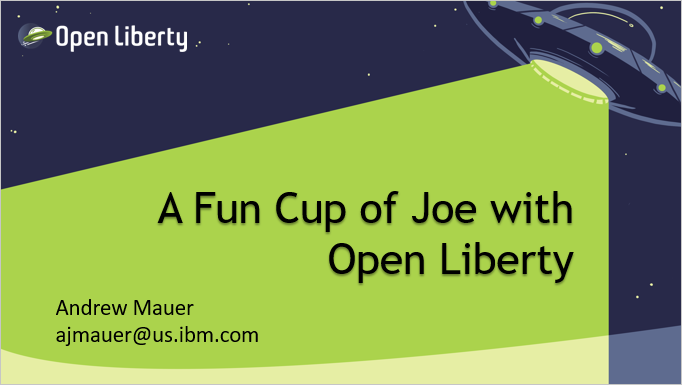 See all blog posts
See all blog posts
A Fun Cup of Joe - Find Out Why Open Liberty is Your Next Cloud Native Java Runtime
Why Open Liberty?
I recently had the opportunity to lead a discussion at a meeting of the Philadelphia Java User Group (JUG) meetup where I highlighted the latest features and design ideas contained within Open Liberty. As part of that discussion I ran two demos where I created and interacted with an Open Liberty-hosted RESTful web service as an application developer - both in a local developer environment and live in a remote Kubernetes cluster environment. As the popularity of a microservice architecture and cloud-native application development experience grows, it is an exciting time to talk about the Open Liberty framework’s support of those models.

The presentation focused on how Open Liberty highly optimizes the development of microservices by using Eclipse MicroProfile and Jakarta EE APIs. To highlight Open Liberty as a flexible, fast, and lightweight Java runtime, the discussion touched on important Open Liberty framework design attributes such as:
-
Simple configuration enabling "Just Enough Runtime" which allows for the configuration of only the subset of features an application needs at runtime
-
Low operating cost due to a reduced memory footprint based on that minimal configuration
-
Zero migration
-
Kubernetes optimizations
-
An efficient rapid developer experience
Additionally, the fact that Open Liberty supports the deployment of Spring Boot applications generated an enthusiastic question from a member of the audience interested in understanding how Open Liberty could help a shop with hundreds of Spring Boot applications become more efficient.
Open Liberty in Action
The second half of the Open Liberty overview detailed its rich developer experience through Open Liberty’s support of rapid development using a tight inner-loop experience that’s provided by the Liberty Maven Plugin. In the first demo, code and configuration updates were shown to take place immediately in a local running Open Liberty runtime instance that was managed by the Liberty Maven Plugin on behalf of the developer, with test cases running to automatically provide immediate developer feedback. In the second demo, Open Liberty’s Kubernetes integration points were demonstrated, showing that same developer inner-loop experience occurring in a remote development cluster hosted in a Red Hat OpenShift environment.
Feel free to check out video segments of the discussion at the following links:
-
Demo 1 - Developing locally with Open Liberty’s dev mode
By demonstrating a Java RESTful application being enhanced locally in an IDE, the participants were able to see the quick turnaround time developers can achieve using the dev mode feature of the Liberty Maven Plugin.
-
Demo 2 - Developing live in a Kubernetes environment with Open Liberty
Participants were able to observe in real-time the effect of an application code update being reflected automatically in a remote Kubernetes cluster by using the OpenShift Do (odo) tool and the java-openliberty development stack, in conjunction with the same Liberty Maven Plugin to manage the OpenShift interactions on the developer’s part.
The Philadelphia JUG meetup presentation was well attended with 35+ attendees joining via the meetup’s web conferencing tool. The host of the meetup was excited for the group to hear about the strengths of Open Liberty and its developer experience, and I was happy for the opportunity to speak with them. If your group is interested in hearing more, please feel free to reach out to YK and team to schedule a similar discussion at any time.




